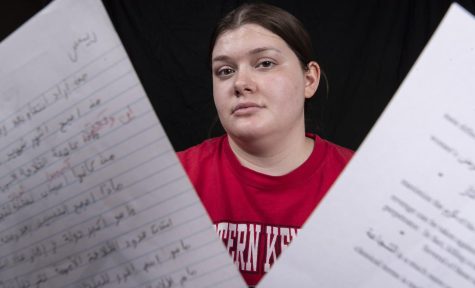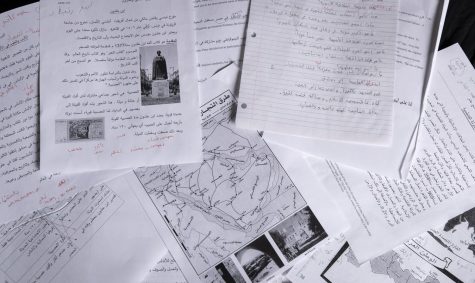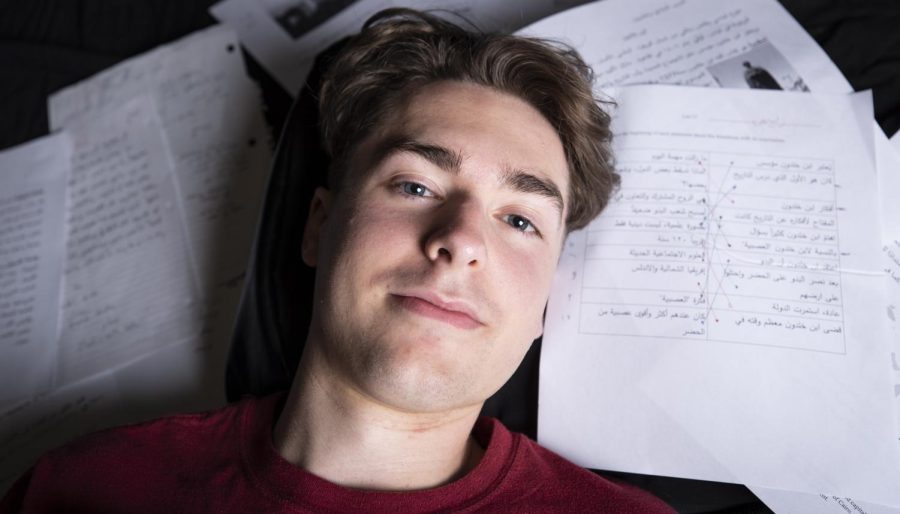‘This is the last of it’: Arabic students grapple with suspension of program
This story originally appeared in the Herald’s printed news magazine edition on Tuesday, Sept. 6.
Tucker Covey / College Heights Herald
Reece Gillespie poses for a portrait in the Herald studio on WKU Campus in Bowling Green, Ky. on Sunday, Aug. 28. Gillespie is an International Business, Arabic and Chinese Flagship student at WKU.
September 12, 2022
WKU officially suspended its Arabic program, one of three language majors that remained at the university, at its third quarterly Board of Regents meeting in August.
According to the meeting agenda, the suspension decision was ultimately made following the retirement of Arabic professor David DiMeo in March, the transfer of professor Lhousseine Guerwane to Purdue University soon after and a drop in enrollment for the program.
The decision left current students to finish their coursework through an in-person class taught by a Fulbright Assistant, Zoom classes and online asynchronous courses.
Students in the program are still able to complete their degree, but some have decided against it due to the difficulty of limited programming.
“They said, ‘oh, don’t worry, the program will still continue. It’s just going to be extremely limited,” Abby Daly, a junior finance major who left the program after hearing of the suspension, said. “I was like, ‘there’s no way this was going to work out for me’.”
Daly, who was a year and a half into the program, realized she was unable to combine the specifically scheduled Arabic courses with the course load of her finance major and chose to withdraw from her spring semester Arabic course.
“I felt it was more conducive to my time to take the ‘W’ and focus on my other courses on top of my job, because that would be stress for a course that ultimately wouldn’t count towards anything,” Daly said.
Reece Gillespie, a fourth year Arabic, international business and Chinese Flagship major, loved the community building opportunities the program offered when he first joined.

“I think in the first semester is when I really met everyone, like the faculty and students,” Gillespie said. “We had all these cool events going on. There would be two or three get-togethers of just everyone making food, and as a whole everyone was vibing.”
Gillespie saw the possibility for the major’s suspension when many community events ceased after the COVID-19 pandemic, despite still having Arabic Club and other department events.
Following DiMeo’s retirement, students saw the writing on the wall.
“Whenever it did actually happen, and we realized what was going on, that there would be no major or minor for future students, I’d say I felt disappointed,” Gillespie said. “Some people I know probably felt a little angry, too.”
When learning a language, students grow into the culture and build a personal connection by speaking that language. Daly said the Arabic major’s suspension not only affected her college career, but affected her personally.
“What was really cool about it for me was that Arabic cultures and Middle Eastern cultures are very negatively portrayed in American media and American culture,” Daly said. “It was nice to learn more about a culture that I had never gotten to see in a positive light, especially growing up in a state like Kentucky.”
The four Arabic courses this year – except Intermediate Arabic I – will be taught online. Gillespie is taking an online course that was the only one to fit his schedule, choosing between Arabic courses that were only available at specific times.
“It definitely won’t be the same,” Gillespie said. “I think they’re trying to accommodate us. I don’t want to say the best that they can, because I feel like there could have been more done. But we’re getting classes and it’s like a ‘now or never’ type thing […] I’m still excited, because there’s a new teacher and a new Fulbright [assistant], but I just know that, at the same time, there’s a little bit of, ‘this is the last of it’.”
The U.S. Department of State classifies Arabic as a category IV “super-hard language” for English speakers to learn. Gillespie said language learning is a subject not compatible with the online format.
“It’s not what anyone wanted, especially after going through it once,” Gillespie said. “But at the same time, we’re used to it now. For language, it’s really critical that you use output and input. I feel like you’re just losing out on the output part, whenever it’s online […] It does suck, but like I said, we’re used to it.”
Meghan Pierce, a junior Arabic and international affairs major, was able to complete the requirements for her Arabic degree last spring and studied abroad in Jordan this past summer. Despite this, Pierce still experienced the uncertainty of the major’s future.
“I remember the last month, especially in the last two weeks, I felt like there was such a tonal dissonance between how the school was presenting how they cared about the Arabic program versus what they were actually doing,” Pierce said. “I remember having that display from the Qatar Foundation in the Honors College and actually having representatives from it come, and it being a celebration about the university’s commitment to Arabic and our ties with promoting education to the Middle East.
Then, three weeks later, they inform people that they’re cutting the program. It was just very difficult and made a lot of people and a lot of students in the program upset.”
DiMeo said while difficult, students completing their degrees online was “the only option that was there, really.”
“I know Dr. [Alexander] Poole looked at all the options, and it was probably very difficult to even get that,” DiMeo said. “Obviously, no one could compare online language instruction with in person. With some subjects, you could, but obviously, with language, you can’t […] but I would stress that I know it’s the best option the university has available, so I don’t fault them for that.”
When the suspension ultimately came, DiMeo said it was not a surprise. “This was obviously what was going to happen,” DiMeo said. “We were told in pretty strong terms, not to share that with students, not to cause a panic, which I think was a bad and probably unconscionable decision, but that’s what we did.”

Terrance Brown, dean of Potter College of Arts and Letters was approached for a statement regarding DiMeo’s comment.
“I cannot comment on the context of Dr. DiMeo’s quote as I was not present for the interview nor know the context of the discussion,” Brown said. “We had to pivot quickly to determine the future of Arabic and its role in the university due to the sudden loss of its primary instructors. The plan is to teach out the remaining students in the bachelor’s program pending approval from the Southern Association of Colleges and Schools Commission on Colleges. Students currently enrolled in the program will be able to complete their degree program.”
DiMeo commended those that were able to continue the program, and he believes that even under new circumstances, they will succeed.
“It’s part of their life, and that’s part of it,” DiMeo said. “What I would say is even from the point that the announcement was made last semester, we’ve seen the numbers drop off sharply. I do know that everyone who has remained in the program are all people who put in a lot of time, a lot of effort outside of class; they always did. I’m not worried about them.”
For DiMeo, one of the main concerns of the suspension is for those who are using a language major as a way to increase competitiveness for other career fields.
“Where it really hits is people for whom this is a value added,” DiMeo said. “Say you’re international business, you’re international affairs, journalism. You’re not going to go pursue an Arabic major for that, but having that as an additional skill broadens your value and makes you a much more appealing candidate, and now they’re going to lose that.”
The 14 remaining Arabic majors will progress past the implications of the major’s suspension, and DiMeo said the real concern lies in future students that no longer have the same opportunity.
“They’re going to have all the skills they need to succeed,” DiMeo said. “Those people, I don’t feel like they’re in danger – It’s just the future generations who just won’t get the opportunity, which is unfortunate.”















